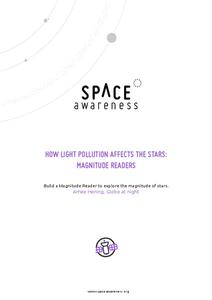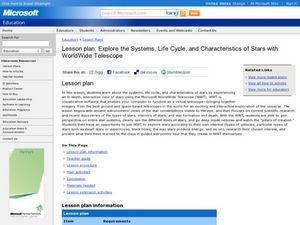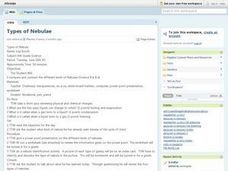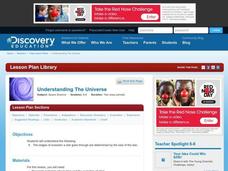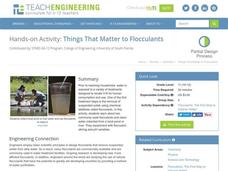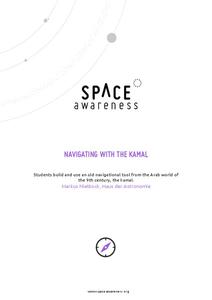Curated OER
Exploring Stars
Students discuss the life of a star and the different types of stars after watching the Discovery video "Exploring Stars". They create a flipbook that demonstrates the life of a star after collecting information on the life cycles of...
Space Awareness
Star in a Box
What happens to stars as they get older? A simulation takes pupils through the life cycle of stars based on their masses. The resource introduces the Hertzsprung-Russell diagram and the common relationships and life cycle patterns observed.
Space Awareness
How Light Pollution Affects the Stars: Magnitude Readers
Did you know light can decrease visibility? Light pollution absolutely makes it more difficult to see stars. Scholars build a simple magnitude reader to determine the magnitude of stars. They use these data to estimate the impact of...
Space Awareness
Make a Star Lantern
Go star-gazing with young learners! They study the history, origins, and patterns of constellations in an activity that explores the starry night sky.
Curated OER
Explore the Characteristics of Stars with Microsoft WorldWide Telescope
Students explore the characteristics of stars. In this space science activity, students use the Microsoft WorldWide Telescope program to identify the properties of stars and identify the stars in the galaxy.
Curated OER
Types Of Nebulae
Eighth graders explore the different types of nebulae that can be found in the solar system. They view a PowerPoint presentation about the material and identify each nebulae as it is presented. Students also discuss the life cycle of a...
Curated OER
The Universe
Young scholars recognize that the stages of evolution a star goes through are determined by the size of the star. They conduct research to draw a set of diagrams illustrating the stages in the evolution of three sizes of stars.
Curated OER
The Battle for Ultimate Power
Students gain an understanding of how the powers of 10 and scientific notation can be used to represent the scale of things in the universe. They relate the number of stars in the universe to the number of grains of sand on Earth's beaches.
Teach Engineering
Antimatter Matters
Use science fiction movies to teach pupils about antimatter and alternate universes. Individuals learn about the portrayal of antimatter and alternate universes in movies such as Star Trek and Angels & Demons. They consider three...
Curated OER
Regents High School Examination: Physical Setting Earth Science 2006
Test your class on earth science with this extensive resource. This test, created by The University of the State of New York Regents, is made up of 50 multiple choice questions and 32 short answer questions that cover the branches of...
Curated OER
The Spectrum of a Star
Tenth graders identify stars based on their line spectra. In this astronomy lesson, 10th graders analyze spectrograph and determine the elements present in the star. They explain the relationship between temperature and star classes.
Curated OER
Exploring Stars
Fifth graders explore the life cycle of stars. They analyze small, medium, and large stars and view a video that compares the life cycles of the various sized stars. They create a flipbook movie detailing the life cycles of a star and...
NASA
Discovering Some of Your “Yardsticks” Are Actually “Meter-sticks”
The Milky Way gets great reviews on Trip Advisor — 100 million stars. The activity allows scholars to rethink their assumptions and prior knowledge. Pupils observe a set of two lights at equal distance and brightness, but they believe...
Space Awareness
Navigation in the Ancient Mediterranean and Beyond
Ancient texts, like Homer's Odyssey, mentions navigating ships by observing constellations. Pupils learn about the link between history and astronomy as they relate to navigation in the Bronze Age. Scholars complete two hands-on...
Curated OER
The North (Wall) Star
Students engage in a instructional activity which shows them that celestial navigation is the art and science of finding one's geographic position by means of astronomical observations, particularly by measuring altitudes of celestial...
Curated OER
Energy: The Universal Currency
Science stars examine the concept of energy by thinking about everyday situations. The lesson plan is incohesive. It lists goals for the student, but doesn't address all of them in the content. The best use of this resource would simply...
Curated OER
How Do We Know...?
Students identify and explain how various inventions and astronomers have improved our appreciation of the universe. Students identify at least two constellations in the sky and discuss how they were used in ancient times to tell time...
Curated OER
A Look At Sunspots
Students research how the development of new technology has increased our knowledge of how the sun works. This lesson is part of a three-part series aimed at showing students how our knowledge of the universe must be inferred through the...
Teach Engineering
Things That Matter to Flocculants
How does the dirt get out of your drinking water? A hands-on activity introduces the use of flocculants to help clear solid particles out of water. The plan walks learners through the process of setting up an experiment that...
Space Awareness
Navigating with the Kamal
Historians have proven that as early as 1497 skilled navigators were using a kamal to sail across oceans. Scholars learn about navigation tools and astronomy before building their own kamals. They then learn how to use it to determine...
Curated OER
Officer Buckle and Gloria
Students write a class letter to a local policeman asking him to come and talk to the class and create a list of safety tips as a class. Students research information on police dogs: type of dogs used, where they come form, how they are...
Curated OER
How Do We Know?
Students investigate the history of astronomy and how the study of constellations has evolved since the dawn of ancient civilization. They conduct research using a variety of resources. The teacher uses demonstrations to model how the...
Curated OER
Hunting for galaxies in the Hubble Deep Field
Students examine Hubble Deep Field images. In this galaxy classification lesson, students research galaxy classification. Students view and classify Hubble Deep field images of galaxies.
Space Awareness
Living in the Milky Way
Get to know our galaxy with an astronomy-themed, hands-on activity. Scholars watch an informative video, answer questions, and construct a model of the Milky Way in order to examine its contents and the distance inside it.


